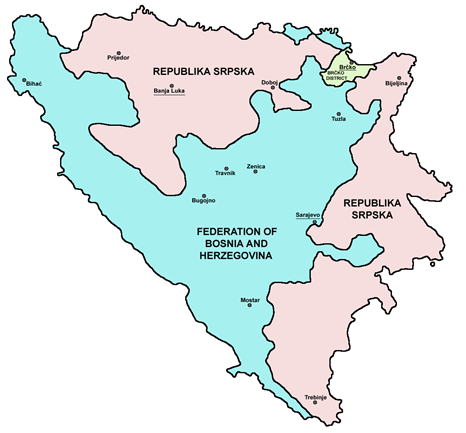Bosnia and Herzegovina - General information
Capital: Sarajevo
Official language: Bosnian, Croatian, Serbian
Official currency: Bosnian Convertible Mark (BAM/KM)
General information
Bosnia and Herzegovina (BiH) declared its independence from Yugoslavia in 1992, following which the Bosnian phase of the Yugoslav War began. The war was ended by the Dayton Peace Agreement signed in 1995, Annex 4 of which contains the current constitution of BiH. According to the constitution, the country consists of two entities with their own constitutions: the Federation of Bosnia and Herzegovina (the "Federation") and the Republic of Bosnia and Herzegovina (Republika Srpska - "RS"). The two jointly administer the Brčko District, which has a special status (but the latter is not considered an independent entity). All three entities have a certain degree of political autonomy. There are three peoples (ethnicities) with constitutional status living in the country: Bosniaks, Serbs and Croats.
Entities of Bosnia and Herzegovina and the Brčko District
(Source: https://en.m.wikipedia.org/wiki/File:Map_Bih_entities.png)
 The main airport of Bosnia and Herzegovina is located in the capital Sarajevo, but Mostar, Banja Luka and Tuzla also have international airports. Train/bus connections mostly operate via Zagreb and Belgrade. The main roads are in good condition in most cases in Bosnia and Herzegovina, in contrast, the national road network is not very developed, it is common that some places can only be reached via lower-grade roads. The traffic culture differs from that of Hungary, and increased caution is recommended on the roads.
The main airport of Bosnia and Herzegovina is located in the capital Sarajevo, but Mostar, Banja Luka and Tuzla also have international airports. Train/bus connections mostly operate via Zagreb and Belgrade. The main roads are in good condition in most cases in Bosnia and Herzegovina, in contrast, the national road network is not very developed, it is common that some places can only be reached via lower-grade roads. The traffic culture differs from that of Hungary, and increased caution is recommended on the roads.
Bosnia and Herzegovina has a continental and Mediterranean climate (Herzegovina), and Sarajevo's weather does not differ much from that of Budapest. However, due to its topography, summers in the high mountains are short and cooler, while winters can be longer and harsher. Summers are hot on the coast, while winters are mild and rainy.
The official currency of Bosnia and Herzegovina is the Convertible Mark (KM/BAM), which is pegged to the Euro (1 Euro = 1.9558 BAM). By law, shops in Bosnia and Herzegovina are not allowed to accept EUR, but many do. There are large chains of shops from many neighboring countries, so shopping is not a problem.
Security situation
The country's public safety is generally good, but increased caution is recommended when traveling. Pickpocketing, burglary, car theft, and break-ins are common. It is important to note that landmines are still present in the country, so when traveling, accurate local knowledge is required, it is recommended to use a local guide who knows the terrain well, and you should not deviate from the designated routes. The frequent heavy rains, floods, and thaws increase the risk of floods and landslides, so mines, as well as mine warning signs and tapes, can move. Earthquakes occur frequently, but these usually do not cause personal injuries.
Health situation, insurance
The health situation is generally considered good, exotic infectious diseases are not typical. According to the information of the National Epidemiological Center, there are no mandatory vaccinations, recommended vaccinations are hepatitis A and B, typhoid, diphtheria-tetanus, tick-borne encephalitis. According to the OEK recommendation, consumption of tap water should be avoided in the region.
Based on the social security agreement between Hungary and Bosnia and Herzegovina, persons entitled to healthcare services in Hungary can use the HU/BH 111 form during their temporary stay in Bosnia and Herzegovina to receive emergency healthcare. Emergency healthcare must be provided by Bosnia and Herzegovina healthcare providers under the same conditions as if they were providing care to a local insured person. The costs of any services beyond this may be fully invoiced to the patient by the Bosnia and Herzegovina healthcare provider.
Sarajevo has extremely high air pollution in winter, due to its geographical location, outdated heating system and old car fleet. The area around the airport is often covered in thick fog in autumn and winter, causing frequent flight delays and cancellations.
Smoking is common in the country, so there are relatively few non-smoking restaurants, cafes and bars, but due to changes in legislation in the FBiH entity, (slow) changes in this regard are expected.
Transportation
Sarajevo is a small city, with public transportation based on a few tram, trolleybus and bus lines. Foreigners generally do not use public transportation. The only means of transportation available are cars (own car or taxi), and due to the short distances within the city, walking is also an option. Cycling is less recommended due to the congested roads and the lack of designated bike paths. Taxis and fuel prices are also cheaper than in Hungary.
Tourist information
Bosnia and Herzegovina offers many opportunities for those who want to spend their free time actively.
In addition to the attractions of Sarajevo's old town and bazaar, it is definitely worth visiting Mostar. The route leads through the Neretva River valley, where whitewater rafting is also possible. Whitewater rafting is also possible on the Drina River in eastern Bosnia and the Una River in the northwestern region, but it is recommended only in local organizations and with guides who know the terrain well (accidents occur regularly due to irresponsible rafting).
Bosnia and Herzegovina's national parks can be an attractive destination for those wishing to hike, where you can admire not only the beautiful environment but also the colorful wildlife. However, when hiking in the mountains, it is always recommended to use a local guide, given that Bosnia and Herzegovina remains the country most contaminated with mines in Europe.
The country's high mountains provide an ideal location for winter sports enthusiasts throughout the winter. In summer, the Neum coast awaits those looking to relax with an authentic Adriatic atmosphere.
Every August, Sarajevo hosts the Sarajevo Film Festival, one of the most prestigious European film festivals, but there are also numerous smaller cultural festivals held throughout the country.

